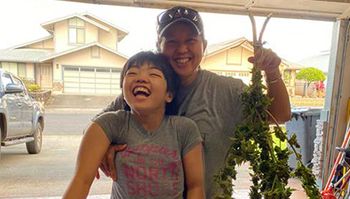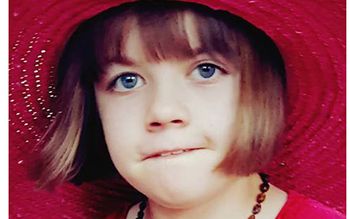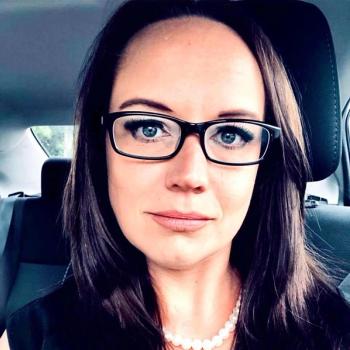
- October 2022
- Volume 3
- Issue 3
- Pages: 22-26
A Mother’s Hope: Cannabinoids Helping Kill Cancer Cells
Here, Tracy Ryan discusses the journey her family has taken to find treatment for her daughter Sophie’s brain tumor, the unexpected discovery of natural killer cells with Dr. Anahid Jewett, and the formation of their company NKore BioTherapeutics.
Tracy Ryan is the co-founder and CCO for NKore BioTherapeutics. Before that, she was CEO and lead consultant for the parent-friendly California-based cannabis corporation CannaKids, focusing on supplying medical cannabis oil to adults and children looking for holistic relief for serious health conditions, and specializing in pediatric cancer. In June 2013, Ryan’s 8-month old daughter, Sophie, was diagnosed with a brain tumor, which doctors said could end up causing vision loss in both eyes. That set Ryan off on a journey to educate herself on the medicinal powers of medical cannabis in treating her own daughter’s disease, as well as all other pediatric and adult cancers, epilepsy, autism, and beyond. Today, doctors are astounded that Sophie’s tumor has shrunk as a result of two infusions of Natural Killer (NK) cell immunotherapy, cannabis oil, and a probiotic developed by her business partner Dr. Anahid Jewett. This is Ryan's story of overcoming obstacles to discover a better way to improve the health and wellness of her daughter. On a very personal level with other parents facing similar cancer diagnoses, she continues her mission to spread the word about the value of medical cannabis through major media outlets and speaking engagements.
The path to a better understanding of the medical benefits of cannabis can often be difficult to navigate. It usually comes as a surprise, because healthcare workers and providers working within standard mainstream medicine need help for specific hard-to-treat conditions. They will try alternate therapies, which is especially important when it comes to their child just starting out in life.
It has to be something that can really work, and can really help even the very young, even as the medical community keeps pushing back against novel ideas of treatment, trying to conceal the blind spots they have in their own education and training.
Sometimes, someone has to step up and take the risks of trying an unproven treatment that could just save the life of their loved one no matter the pushback they experience. Tracy Ryan, mother of cancer patient Sophie, knows that drill all too well.
The Long Journey to the First Dose
Ryan’s journey in cannabis started when her 8-month-old daughter Sophie was diagnosed with a low-grade brain tumor called an optic pathway glioma. Optic pathway gliomas (1) account for 3–5% of all pediatric central nervous system tumors, and represent the most common intrinsic optic nerve tumors. These tumors occur during the first decade of life. Their behavior can be aggressive, and their management is often challenging.
In Sophie’s case, the tumor left her legally blind. The type of tumor that she has wraps around the optic nerves and has stolen a lot of her vision. Various brain surgeries have also caused problems with her eyesight.
“My husband and I discovered very quickly that only 3.8% of all government funding was going to pediatric cancer research,” Ryan said. “There had been little to no advancements in the last 40 years in medicines for children. Our baby only had chemotherapy as an option.”
The chemotherapy they were using “has not been evolved,” Ryan said. “I mean, probably it evolved a little as far as how they administer it. But the treatment itself was the same as it was in the 1980s before we even had cell phones. How is it possible that the world has come this far, in technology, in research, in space travel, all these things that billions and billions of dollars have been spent on, but yet our children have been forgotten? How is that possible?”
It was then when she told her husband, Josh, that she would find out more about helping her daughter. “I’m not going to sit here on my hands and not do anything and just listen to what Western medicine tells us to do for our daughter,” Ryan said. “I would look into Sophie’s eyes and tell her ‘Honey, one day, this is just going to be a story that we tell. I know that in my heart, I’m confident of that. You are going to survive this. You are going to outlive us all. It’s not always going to be this bad.’”
A couple of weeks later, Ryan got a bit of luck from the production partner of TV celebrity Ricki Lake (2). Lake had just begun filming a documentary called Weed the People (in October 2018), which was released in 2018 and is now on Netflix (3).
Lake’s partner, Abby Epstein, the director of the documentary (4), introduced Ryan to medical cannabis and its potential efficacy just in time to help them find cannabis as an alternative for their daughter.
“So, at nine months old, Sophie took her first dose of cannabis on camera,” Ryan said. “There was THC in it, and she started having these miraculous occurrences in her body.”
Over time, Ryan watched as Sophie’s immune system stayed strong. Sophie stopped needing blood transfusions after previously requiring nine of them, and her body just healed itself, which the doctors couldn’t explain. “Her healing ability after surgeries was unlike anything her neurosurgeons had seen in their careers,” Ryan said. “There was no visible swelling and bruising. Her health as a whole improved. She had failed seven chemotherapies and clinical trials up until a couple of years ago. It was then that I knew that there was something more.”
An Inspiration is Born
What she witnessed with her young daughter inspired Ryan to create CannaKids (5), which was essentially a tincture company that serviced patients in California while providing dosing guidance to patients around the world. Ryan served as CEO and Josh was director of outside sales. “When I started seeing the efficacy in so many people for so many different diseases, cancer being one of them, I really wanted to understand more,” Ryan said.
That work with CannaKids led her to Dr. Anahid Jewett (6), the professor and director of Tumor Immunology Laboratory at UCLA Health, who agreed to help with Sophie right after her second brain surgery in 2018. “Dr. Jewett started studying Sophie’s brain tissue. When she looked at Sophie’s blood, she couldn’t understand the immune function that she was seeing in a child that had brain cancer. And it was through that interaction that we became business partners, friends, and colleagues,” Ryan said. “Now we’re trying to change the world together.”
The Startling Discoveries
This was a journey for Dr. Jewett as well. She had been saying that she wasn’t the kind of doctor that wanted to face sick children. She wanted to stay in the laboratory, especially when it came to pediatrics because she found it difficult to bear witness to what was happening to these children who weren’t really getting better. They were just being treated and allowed to remain status quo. “Cannabis was never even remotely on her radar,” Ryan said. “She didn’t believe that there was this great therapeutic value to it. But she has since completely changed her mind and now recommends that any patient who comes to us gets on cannabis.”
When Dr. Jewett started working on Sophie, she was amazed. “First of all, this is low-grade glioma and it’s supposed to be low in growing tumors. I found that to be the complete opposite with Sophie. It was growing at a much faster pace in my laboratory,“ said Dr. Jewett. “The second thing was that when I was looking at her immune system, it was very different from what I had seen in cancer patients. So those two things made me not only interested to follow up, but also to understand why Sophie has the cancer with that level of immunity that she has.”
Dr. Jewett thought that the first thing she was going to find was a suppressed immune system in Sophie. “I saw the complete opposite of that. And so that was intriguing to me, and I wanted to follow up.”
Part of why that was happening was the action of certain immune cells—the natural killer (NK) cells—which are lymphocytes in the same family as T and B cells (7). But as cells of the immune system, NK cells are best known for killing virally infected cells, and detecting and controlling early signs of cancer.
The NK cells were “obliterating” the cancer cells in Sophie, explained Dr. Jewett. “NK cells were very important in targeting cancer stem cells, and those are the most aggressive cells,” Dr. Jewett said. “If you can eliminate those cells, you can cure cancer, basically.”
Sophie was six years old at the time of Dr. Jewett’s tests. Her NKs were functioning at five times the level of any healthy patient Dr. Jewett had studied in her 30-plus-year career (8).
Dr. Jewett also found out that synthetic cannabinoids can target the same aggressive tumors. “It’s mind boggling,” Dr. Jewett said. “I would have never guessed that this could be the case, because I’ve looked at big chemo drugs and I’ve given significant levels of chemo drugs, not only in the animal models but also into the cells directly. And I could not see any death in those cells yet. But this synthetic cannabinoid that I’m working on is doing the job.”
Dr. Jewett saw other patients on cannabis also had much better NK activity than even healthy individuals. “So that was intriguing to me also,” she said. “I wanted to know how that is happening, and why that is happening. So I started working on a humanized mouse model system, because I know that is the most relevant model to the human system. And when I injected the same synthetic cannabinoids into a mouse, I saw very high levels of activation of NK cells.”
She said that one of her plans for the future is to actually modify these synthetic cannabinoids in such a way that they could increase the activation of the NKs, and use it as therapeutics.
The Door to Successful Treatment Opens
Ryan said that now they can go forward with more clinical work based on what Dr. Jewett has discovered—such as her findings about cannabinoids, targeting and killing cancer stem cells, and rebooting the immune system.
All of those findings were published in a peer-reviewed cancer journal (9).
“So, we’re working on getting FDA approval,” Ryan said. “We’re going to be submitting our application here in the next few weeks for our human trials. And we’re working on setting up other human trials through medical tourism in countries where it’s much easier to get approved.”
Going Forward
Ryan and Dr. Jewett, along with two other partners, created NKore BioTherapeutics (10), a biotech company that has licensed Dr. Jewett’s core suite of patents for both her supercharged NK cells, her suite of diagnostics that test the NK cell system, and a synthetic cannabinoid that they intend to use as a booster to NKore’s therapy, as well as other chemotherapies available today.
Sophie is much healthier today, especially after getting her father’s activated NK cells. “The NK cell therapy that she got was her dad’s natural killer cells that were activated. And what that means is that they use interleukin 2 (11) that also comes from the body but it’s unfortunately pretty toxic to patients,“ explained Ryan. “It is a short-lived five-day course of this as a booster to the cells. It’s used in activating the cells, simply turning on their killing ability. And then the patient has to get several days of shots of it.
“The NK cells from her father were not supercharged like the ones that Dr. Jewett has invented and that NKore is now working to bring to market,” Ryan said. “However, not only is the therapy working, but it started working basically immediately after the first two-and-a-half months’ scan. We’re seeing the tumor at about an 85% overall reduction in size, and it continues to die off with therapy.”
The reason Sophie got her dad's cells instead of the NKore’s supercharged cell therapy now is because Dr. Jewett created a whole new cell that’s never existed before. The body sees it as a natural component of their immune system, so there’s no possibility of rejection. “But because we are changing the cell structure of our natural killer cells with this new cell, not the DNA, but just the cell itself, we have to get FDA approval,” Ryan said.
She said that they are close to being ready to submit their FDA application to get what’s called investigative new drug (IND) approval, which means they can start to move forward with human trials in the US with their first focus being pancreatic cancer (12). “Once that is approved, under the FDA’s Expanded Access, sometimes called compassionate use (13), which states that if a patient has exhausted everything Western medicine has to give them and are deemed terminal, they can treat individuals with any type of cancer once approved,” Ryan said.
They can get approval for them in 30 days after submitting the application for that patient to the FDA. “So, while we’re going through these very structured human trials here in the United States, we are also planning on opening up the opportunity for these compassionate use single patient IND opportunities for patients,” she said.
The plan is to bring this cell treatment to market through FDA—both the supercharged natural killer cells that her company owns the patents to, and the research Dr. Jewett has been doing over the last 30 years at UCLA, along with the cannabinoid medicine that can be used with the natural killer cells treatment. “My ultimate goal is to have a cancer therapy, which would be a combinational therapy that does not make the patient sick, and fixes the core reason they got cancer in the first place,” said Ryan.
Sophie has had two infusions in recent months: one in September 2021 and the second in December 2021. “She has had 12 days of sickness since September, and that’s it,” Ryan said. “And even after this last infusion, Dr. Jewett continues to study her. Her blood and her immune system continue to function at extremely high levels, even though she hasn’t had a treatment since December.”
Ryan said that she, her husband Josh, and Sophie—working with Dr. Jewett—are optimistic that they will be able to eradicate Sophie’s disease especially after the enormous amount of shrinkage that they’ve seen. “I’m optimistic that we’re going to get rid of the disease,” Ryan said. “After the amount of shrinkage we have continued to see scan after scan, we are confident we have fixed the immune system in her brain. This would be the first time that a low-grade glioma like this has been eradicated with the treatment.”
Broadening the Advocacy Work
Ryan has spent the last nine years of her life traveling the world for speaking engagements to try and get the word out about case studies like Sophie’s and other patients that they’ve treated.
“Throughout this journey, not only has it helped Sophie and us believe that cannabis not only protects her body from the chemo and radiation, but it also helps her with side effects and immune stimulation,” Ryan said. “She’s also the happiest child you will ever meet in your entire life. And to watch Sophie be this vibrant, outgoing, spunky child when she’s standing in a row of other cancer patients who are shy and recoiled and traumatized, that makes me hope everyone has an opportunity for their child to have a journey that’s closer in replication to my own daughter’s.”
Conclusion
Sophie still remains on whole plant cannabis as well as a probiotic bacteria called AJ4 that Dr. Jewett has created and that they are in the process of licensing at NKore BioTherapeutics. AJ4 is a probiotic that was developed by Dr. Jewett as a cancer treatment that works to boost NK cell function exponentially. It is not yet available to the public, but there is a probiotic close in relation that is available at
Ryan said that she was literally looking at Sophie’s recent scans as she talked to us. “It is unbelievable how much cell death we are witnessing eight months off treatment after only two infusions of her daddy’s natural killer cells. She’s never been healthier in her entire life,” Ryan said. “Her immune system is so boosted right now with the treatments that we have given her that according to one of the scientists on our team, she has the highest recorded immune function they’ve ever seen documented in pediatric history. So, she just keeps getting healthier, which is what every mother and father wants to see in their child.”
References
https://www.ncbi.nlm.nih.gov/pmc/articles/PMC6169473/ https://www.imdb.com/name/nm0001442/bio https://www.imdb.com/title/tt7968976/ https://www.imdb.com/title/tt7968976/fullcredits?ref_=tt_ov_st_sm https://cannakids.org/about-us/ https://www.linkedin.com/in/anahid-jewett-436435103 https://www.immunology.org/public-information/bitesized-immunology/cells/natural-killer-cells https://www.nkore.com/synthetic-cannabinoid-inhibits-growth-and-induces-cell-death-of-oral-and-pancreatic-stem-like-poorly-differentiated-tumor-cells https://www.sciencedirect.com/science/article/pii/S266739402200017X https://www.nkore.com https://www.cancer.gov/publications/dictionaries/cancer-terms/def/interleukin-2 https://www.fda.gov/drugs/types-applications/investigational-new-drug-ind-application https://www.fda.gov/news-events/public-health-focus/expanded-access
About the Author
David Hodes has written for many cannabis publications, and organized or moderated sessions at national and international cannabis trade shows. He was voted the 2018 Journalist of the Year by Americans for Safe Access, the world’s largest medical cannabis advocacy organization.
Articles in this issue
about 3 years ago
Cannabis Patient Care October 2022 Digital Editionabout 3 years ago
Overview of the Research on Cannabis for Pediatric Oncologyabout 3 years ago
Cannabis for Children with Cancerabout 3 years ago
The Great Debate: Kids, Cancer, and CannabisNewsletter
Unlock the latest breakthroughs in cannabis science—subscribe now to get expert insights, research, and industry updates delivered to your inbox.



